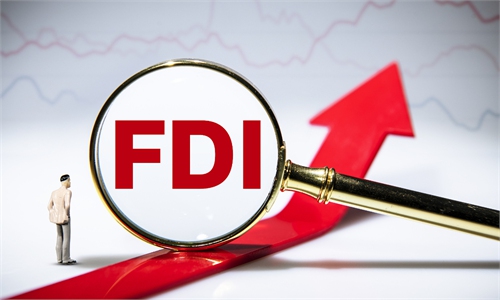Foreign investment remains stable in H1, reaching 703.7 billion yuan: Commerce Ministry

Lujiazui Photo:VCG
Foreign investment in China remained stable in the first half of this year, and the country saw rapid growth in the number of newly established overseas enterprises, China's Ministry of Commerce (MOFCOM) said on Wednesday, as executives from multinational corporations have been visiting China to seek new opportunities for investment cooperation opportunities.
Vice Minister of Commerce Guo Tingting said that from January to June, the country saw 24,000 newly established foreign invested firms, an increase of 35.7 percent. The actual use of foreign direct investment (FDI) amounted to 703.7 billion yuan ($97.6 billion), down 2.7 percent year-on-year.
"It is not easy to achieve the results as major FDI source countries are facing different economic pressures," Li Yong, a deputy chair of the expert committee of the China Association of International Trade, told the Global Times on Wednesday.
The increase in the number of new foreign-funded enterprises indicates the confidence of foreign investors in China's growth prospects and investment environment, Li added.
Capital investment in China from developed countries continued to grow, with investment from France surging 173.3 percent and that from the UK growing 135.3 percent. Japan's investment in China grew 53 percent and that from Germany was up 14.2 percent, according to Guo.
Li said that the Chinese market offers more opportunities and possibilities for growth for companies from countries like France and the UK, and enterprises in those countries have more room for independent investment decision-making.
On Wednesday, the third phase of Schneider Shanghai Power Distribution Electrical Appliance Co's factory was completed. This is a new digital and automated "zero-carbon factory" built by Schneider Electric. With the completion, the overall production capacity is expected to increase by 30 percent.
"The plant's establishment is another testimony to showcase our confidence in China," said Yin Zheng, executive vice president of China and East Asia operations. Rooted in China for 36 years, the company has kept on investing in innovation and supply chains in China.
In 2022, against the backdrop of a 12 percent decline in global cross-border investment, China's FDI rose 6.3 percent, with the actual use of FDI reaching 1.2 trillion yuan, an increase of 8 percent, Zhu Bing, a MOFCOM official, said.
Executives of multinational corporations have continued to visit China to seek new opportunities for investment and cooperation. They said that the Chinese market contains massive development opportunities, which are not "optional" but "mandatory," and they will continue to increase their investment in China according to Zhu.
"In the second half of the year, a number of executives of multinational companies plan to visit China, and we will provide maximum convenience for them to come to China to inspect the investment environment, buttress their development strategies and discuss cooperation projects. We welcome multinational companies to continue to invest in China and share the dividends of China's huge market and open development," Zhu said.
The National Development and Reform Commission, the country's top economic planner, said on Tuesday that it will formulate policies to attract more foreign investment, expand market access and comprehensively optimize business environment.
It will strengthen communications with foreign enterprises and foreign chambers of commerce, coordinating and addressing in a timely manner the problems and requirements of all foreign enterprises.

